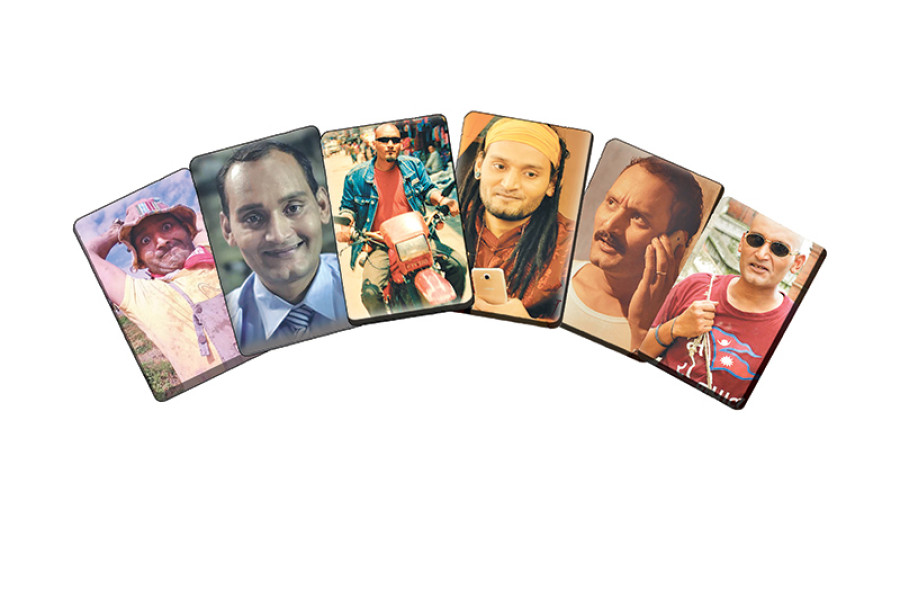Miscellaneous
The ‘un-heroic’ hero
It’s an overcast evening and Bipin Karki is at a studio in Anamnagar that he has been frequenting to finalise the sound mixing for Hari, his latest film. With a disarming personality and an infectious smile, it is at times hard to believe that in three short years since his breakthrough with Pashupati Prasad, Karki has become one of the most bankable stars in the Nepali film industry. But even Karki—who exudes no aura you’d associate with filmstars—is aware that he is not the typecast of what a ‘hero’ in a film should look, or behave, like.
Timothy Aryal
It’s an overcast evening and Bipin Karki is at a studio in Anamnagar that he has been frequenting to finalise the sound mixing for Hari, his latest film. With a disarming personality and an infectious smile, it is at times hard to believe that in three short years since his breakthrough with Pashupati Prasad, Karki has become one of the most bankable stars in the Nepali film industry. But even Karki—who exudes no aura you’d associate with filmstars—is aware that he is not the typecast of what a ‘hero’ in a film should look, or behave, like.
Karki has so far acted in over 20 dramas and a dozen films; and every role he has played—whether that be the knieving Bhasme Don in Pashupati Prasad, the mohawk-ed Goldie in Naaka or the endearingly innocent Phanindra Timilsina in Jatra—he has immortalised.
But more importantly, each role that Karki has taken up, no matter how different, he seems to imbue with such whole heartedness that it becomes impossible to extricate the actor from the act.So what does happen when actors immerse themselves so completely into the character that there is not a hint of a real-life persona?
Method acting, a form of acting that evolved from a system propounded by Russian actor and theatre practioner Konstantin Stanislavski, asks the actors to have a complete emotional identification with
the role they portray. Most method actors, while going about playing a certain role, draw from the wealth of emotional experiences they have had in their life so far. Over his life, Karki has had several false starts, has worked odd jobs—once for a liquor company and as a marketing officer for a FM station.
“So you could say that I draw from these various experiences in some way when I slip into a role. But beyond that, my journey as an actor truly started when I worked as a backstage crew at shootings. I would spend the entire day completely lost in the action taking place in front of me.”
The transition from that backstage boy to the now actor Bipin Karki, however, has not been easy. Most of the troubles have come from his form of extreme method acting, as he likes to stay in character even if he is off the set. “Sometimes when I am angry, my wife can’t tell if I am in character or if my anger is genuine,” Karki says, “I was married a couple of years ago, and my wife often got frustrated with what she calls my ‘ludicrous behaviour’, but now she enjoys when I am preparing for a role.”
Not only has this obsessive affinity with his characters interfered with his personal life, but sometimes it extends to the set as well.Once Karki found himself at odds with the constume designer, during the shooting of Lalpurja: “I was not completely satisfied with the costume designed for my character. I was supposed to wear jeans but I thought dungarees would be more appropriate. So I went to the tailor during the shoot and had it sown myself. This is something I think is compulsory when it comes to getting inside the skin of the character.”
Karki’s latest film, Hari, is in the theatres now and in it, he plays four different characters. “The roles were not any easier,” he says, “But since these characters are something that all of us have seen and known and also because I was involved in the filmmaking process from early on, I had ample time and space to prepare for the characters for the film. The hardest part was probably having to change costumes so often!”
In Hari, though he plays multiple roles, as in his previous outings, it is hard to extricate the actor from the act. For Karki has taken, what can be termed, an ‘un-heroic hero’, to a whole new level. But the actor remains choosy in picking up the roles, despite offers coming in thick and fast. “I have been taking, and will continue to take, only those offers that I think have a well-founded character,” the actor says.
Karki adds that he is not afraid to improvise a given role and to strive to perform roles in way that has not been done before. “While I do admire plenty of actors and acting theorists, I seek to have it my own way. In the same vein, while I agree with, say, Stanislavasky for the most part, I don’t totally follow his advice, because everyone, as is every character, is different and one has to find their own way to go about portraying it, be it in the character or even in real life. Even if that puts you at odds with the world.”




 8.84°C Kathmandu
8.84°C Kathmandu










